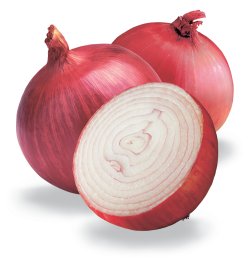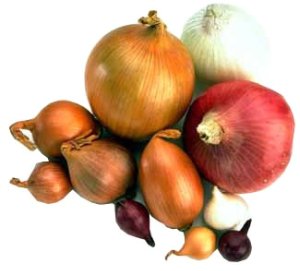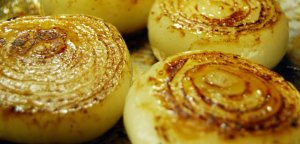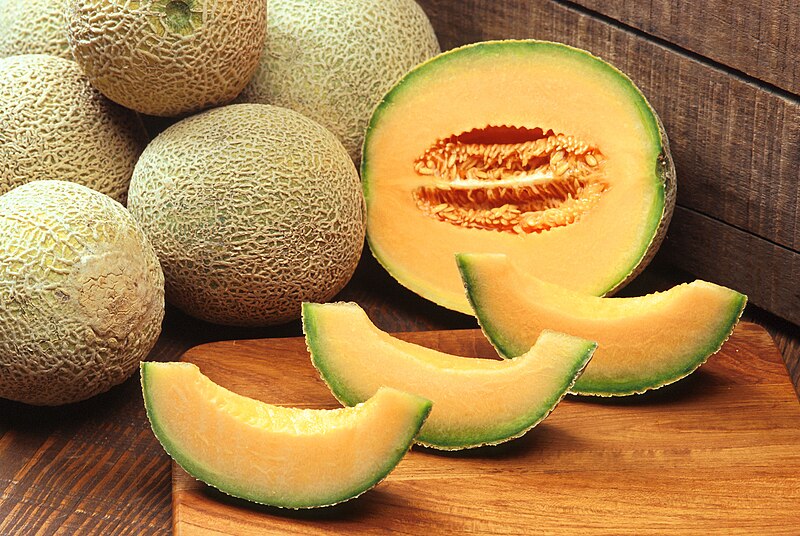I purchased a large onion this past weekend from the flea market from a local grower. This onion was YUMMY all by it self raw, yes plain fresh onion. So I decided to take a closer look at the onion and all its health benefits. I am very impressed and so glad I love onions. Here is why:
If you've landed here because you've heard of the health benefits of onions and you want to know more, prepare to be amazed.
If you weren't eating onions before, you will, after reading this article!
- See more at: http://www.foods-healing-power.com/health-benefits-of-onions.html#sthash.apNlCDEV.dpuf
People have known of the health benefits of onions for thousands of years, but only relatively recently scientists have started to do a lot of research into the health giving properties of this humble vegetable, and guess what?
Studies after studies have confirmed that onions indeed possess many active compounds that have been proven beneficial for all sorts of conditions.
On this page you'll find:
- Onions Nutritional Highlights
- Onions, Rich Source of Quercitin
- Detoxify Your Body with Onions
- Onions and the Heart
- Cancer Prevention
- Other Health Benefits of Onions
- Quick Serving Suggestions
ONIONS NUTRITIONAL HIGHLIGHTS
Onions are a very good source of vitamin C, B6, biotin, chromium, calcium and dietary fibre. In addition, they contain good amounts of folic acid and vitamin B1 and K.
A 100 gram serving provides 44 calories, mostly as complex carbohydrate, with 1.4 grams of fibre.
Like garlic, onions also have the enzyme alliinase, which is released when an onion is cut or crushed and it causes your eyes to water.
They also contain flavonoids, which are pigments that give vegetables their colour. These compounds act as antioxidants, have a direct antitumor effect and have immune-enhancing properties.
Onions contain a large amount of sulfur and are especially good for the liver. As a sulfur food, they mix best with proteins, as they stimulate the action of the amino acids to the brain and nervous system.
ONIONS, RICH SOURCE OF QUERCITIN
The onion is the richest dietary source of quercitin, a potent antioxidant flavonoid (also in shallots, yellow and red onions only but not in white onions), which is found on and near the skin and is particularly linked to the health benefits of onions.
Quercitin has been shown to thin the blood, lower cholesterol, raise good-type HDL cholesterol, ward off blood clots, fight asthma, chronic bronchitis, hay fever, diabetes, atherosclerosis and infections and is specifically linked to inhibiting human stomach cancer.
It's also an anti-inflammatory, antibiotic, antiviral, thought to have diverse anti-cancer powers. Quercitin is also a sedative. So far, there is no better food source of quercitin than onion skins.
You don't need to eat loads of onions to achieve these effects. In fact, studies show that you can reap the health benefits of onions by eating just one medium onion, raw or cooked, a day.
DETOXIFY YOUR BODY WITH ONIONS
Onions contain a variety of organic sulfur compounds that provide health benefits.
Sulfur-containing amino acids are found in onions as well as garlic and eggs.
These specific amino acids are called methionine and cystine and, among other things, they are very good at detoxifying your body from heavy metals.
In fact, they are able to latch on to mercury, cadmium and lead and escort them out of the body.
Vitamin C, also contained in onions, is excellent at detoxifying the body and is effective in removing lead, arsenic and cadmium. So increasing consumption of onions can help the body to get rid of these harmful metals.
ONIONS AND THE HEART
To help keep your blood free of clots, and make the most of the health benefits of onions, eat them both raw and cooked.
Prescribing onions for heart patients is hardly routine among cardiologists. But Harvard's Dr. Victor Gurewich advises all his patients with coronary heart disease to eat onions daily.
Here are some of the things that onions can do for your heart:
- Boost beneficial HDL cholesterol
- Thin the blood
- Retard blood clotting
- Lower total blood cholesterol
- Lower triglycerides
- Lower blood pressure
CANCER PREVENTION
One way the antioxidants in onions can protect you against cancer is by reducing the DNA damage in cells caused by free radicals, studies reveal.
All onions and onion relatives (garlic, leeks, chives and scallions, or spring onions) are rich in organosulfur compounds shown to help prevent cancer in lab animals.
In fact, an onion extract was found to destroy tumor cells in test tubes and to arrest tumor growth when tumor cells were implanted in rats.
The onion extract was shown to be unusually nontoxic, since a dose as high as forty times that of the dose required to kill the tumor cells had no adverse effect on the host.
In addition, shallots have been shown to exhibit significant activity against leukemia in mice.
OTHER HEALTH BENEFITS OF ONIONS
Onions have also been shown to have a significant blood sugar-lowering action, even comparable to some prescription drugs.
The active compound that seems to be responsible for lowering glucose works by competing with insulin for breakdown sites in the liver, thereby increasing the life span of insulin.
Onions have historically been used to treat asthma, too. Its action in asthma is due to its ability to inhibit the production of compounds that cause the bronchial muscle to spasm and to relax bronchial muscle.
Onions have potent antibacterial activity, destroying many disease-causing pathogens, including E. coli and salmonella.
From one of my readers, Lynley Kempthorne:
Chop up a raw onion and cover it with honey (manuka honey is even better) and let it stand for four or five hours. It makes an excellent cough syrup and is wonderfully soothing for an inflamed throat.
Thank you Lynley |
QUICK SERVING SUGGESTIONS:
The liberal use of onions and other bulbs of the same family, such as garlic, leeks and shallots, seems a particularly good idea considering their healing effects on the major degenerative diseases so common today, such as atherosclerosis, diabetes and cancer.
So try to enjoy the health benefits of onions as much as you can and to include them in your diet in every possible way.
Here are some quick serving ideas:
- Onions can be eaten on their own steamed, boiled or roasted.
- Sautéed chopped onions can be added to almost any vegetable dish to enhance its nutritional content and taste.
- For an instant vegetarian chilli, heat together 1 medium chopped sautéed onion, with 12-oz/350 g. can of kidney beans, 12 oz/350 g. of chunky tomato sauce, and 2 tablespoons of olive oil, and season to taste with chili powder.
- Chop 1 red onion, 2 medium tomatoes, 2 avocados and 1 jalapeno and combine together for an all-in-one guacamole salsa dip.
- Place chunks of onion or small pearl onions on a skewer, either alone or with other vegetables, coat lightly with olive oil, and grill for approximately 10 minutes.
I hope you enjoyed reading about the health benefits of onions and I've managed to persuade you to make room for onions in your every day meals.
As you've seen, you don't need to eat a lot, but any amount will be extremely beneficial to your health.
- See more at: http://www.foods-healing-power.com/health-benefits-of-onions.html#sthash.apNlCDEV.dpuf


























